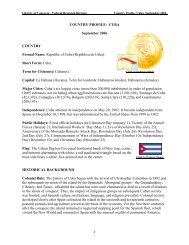1 - American Memory
1 - American Memory
1 - American Memory
Create successful ePaper yourself
Turn your PDF publications into a flip-book with our unique Google optimized e-Paper software.
220<br />
through 176 days of Interruptions in shipping service. This is aMn to having<br />
the city of Washington totally barricaded for 176 days.<br />
With the exception of a two-day local dispute, these Interruptions were entirely<br />
ontslde of Hawaii's jurisdiction. Shipping to Hawaii was curtailed by longshore<br />
and maritime disputes on the Mainland. Needless to say, such interruptions have<br />
had an adverse effect on our total economy. It is Ironic that such interruptions do<br />
not affect the Mainland states as they do Hawaii, which depends so heavily on<br />
ocean shipping for our people's basic needs. This Is not to overlook the economic<br />
effects on the export businesses on the Mainland, including the inland farmers<br />
who need to have their products moved to overseas consumers to continue viable<br />
operations. The important point is that basic Mainland supplies to Hawaii are<br />
cut off whenever a maritime dispute occurs on the West Coast.<br />
H.E. 7189, If it does not tread on the principle of free collective bargaining or<br />
violate existing and effective concepts embodied in federal laws relating to marl-<br />
time commerce, can Insure the maintenance of normal supply lines to Hawaii<br />
while providing additional time necessary for the settlement of any future dis-<br />
putes.<br />
It is respectfully sugrgested that the Subcommittee on Transportation and<br />
Aeronautics consider, at this time, a comprehensive study leading to a more<br />
permanent solution to the Nation's total transportation problems.<br />
Our Nation has faced recurrent interruptions in all our major modes of trans-<br />
portation—in ocean, air and overland transportation systems. The consumers,<br />
the citizens of this Nation, have been the victims in all these interruptions. Our<br />
citizens should have the benefit of greater reliability and efficiency in our trans-<br />
portation networks.<br />
Perhaps the time has come for more serious consideration of alternatives that<br />
have been accepted—and effectively implemented—by other countries. It is sug-<br />
gested that initiatives be taken for the ultimate nationalization of our basic<br />
transportation systems. It is recognized that the federalization of our major net-<br />
works in ocean shipping, airlines and railroads raises myriad and complex prob-<br />
lems. On the other hand, federal regulation of these industries has not led to the<br />
dependability and efficiency that our citizens desire and deserve. We cannot con-<br />
tinue to ignore the need for drastic changes that must be Initiated now if we are<br />
to effectively meet our needs tomorrow.<br />
In ndditinn to immediate consideration of H.R. 7189, we therefore urge a more<br />
comprehensive and long-term approach to our country's total transportation<br />
needs for the future.<br />
The Nation, as well as Hawaii, can best be served by Congressional initiative<br />
In this vital national problem.<br />
THE SENATB,<br />
STATE OF HAWAH,<br />
June 4,1979.<br />
Hon. SPABK M. MATStriTAOA,<br />
House of Repre»entative»,<br />
Wcuhington, B.C.<br />
DEAB SPABK : Thank you for your message Inviting me to testify before the<br />
Subcommittee on Transportation and Aeronautics of the House Committee on<br />
Interstate and Foreign Commerce relative to H.R. 7189.<br />
As yon know, all of us in Hawaii have been concerned with the problems caused<br />
onr people by Interruptions in shipping service to and from Hawaii.<br />
Last November I outlined what I thought was a sensible approach to resolving<br />
this problem. Basically, it involved getting all of the unions and managements<br />
concerned with maritime activity to sit down together and work out an<br />
approach or approaches for handling labor management disputes in the maritime<br />
Industry which would virtually eliminate interruptions in shipping.<br />
Subsequent to this, I spent several days in Washington, Detroit, and San Francisco<br />
discussing thi.s approach with high-level representatives of labor and management.<br />
As a result of these meetings, I was Invited to present the problem to<br />
the annual Executive Board meeting of the Maritime Trades Department, AFI/-<br />
CIO. This was accomplished and a presentation made to the Executive Board on<br />
February 16, 1973 in Miami, Florida. During the presentation I asked that the<br />
MTD take the lead in calling a meeting for this purpose. Mr. Paul Hall, president<br />
of the Maritime Trades Department, promised his full cooperation.<br />
On Friday, May 2.5, 1973, a meeting was held in San Francisco with high-level<br />
union officials to further discuss a resolution of the problem. Mr. Paul Hall,<br />
president of the MTD, presided at the meeting. The meeting was actually put<br />
together by Mr. Morris Welsburger, vice president of the SIU.<br />
»7-54» O - 74 - 16



![Albert Einstein Papers [finding aid]. Library of Congress. [PDF ...](https://img.yumpu.com/21604228/1/190x245/albert-einstein-papers-finding-aid-library-of-congress-pdf-.jpg?quality=85)





![American Colony in Jerusalem Collection [finding aid]. Library of ...](https://img.yumpu.com/17941275/1/190x245/american-colony-in-jerusalem-collection-finding-aid-library-of-.jpg?quality=85)



![Piccard Family Papers [finding aid]. - American Memory - Library of ...](https://img.yumpu.com/17941234/1/190x245/piccard-family-papers-finding-aid-american-memory-library-of-.jpg?quality=85)


